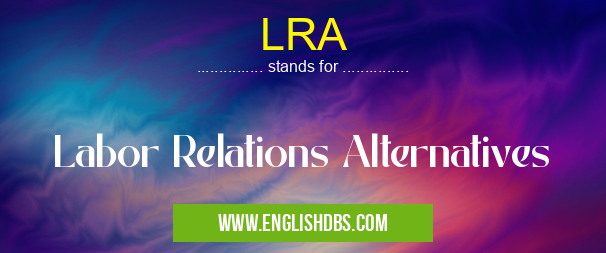What does LRA mean in UNCLASSIFIED
Labor Relations Alternatives (LRA) is an abbreviation for a broad set of approaches, processes, and tools that promote constructive labor-management relationships. It incorporates methods such as alternative dispute resolution, collective bargaining, labor-management cooperation initiatives, communication and negotiation skills development, and monitoring of collective bargaining agreements. Labor relations alternatives promote a productive work environment by developing workplace strategies to prevent labor disputes from escalating into costly conflicts. These strategies may include mediation, arbitration, negotiations between the parties involved in a dispute or grievance procedure within the framework of a collective agreement.

LRA meaning in Unclassified in Miscellaneous
LRA mostly used in an acronym Unclassified in Category Miscellaneous that means Labor Relations Alternatives
Shorthand: LRA,
Full Form: Labor Relations Alternatives
For more information of "Labor Relations Alternatives", see the section below.
Core Concept
The core concept of LRA is to allow employers and employees to come together in an effort to resolve workplace conflict without resorting to legal action. The idea behind this is that by having managers understand their employees better and reach agreements on important issues without having to involve lawyers or other third parties, both parties can move forward with greater understanding and mutual respect for each other’s position. This approach also encourages collaboration between management and labor instead of confrontational tactics like strikes or lockouts that could potentially damage the business relationship as well as disrupt operations.
Benefits
The benefits of LRA include increased productivity from improved morale among workers; less downtime due to fewer workplace conflicts; better communication between employers and employees; lower risk of litigation; reduced costs associated with conflict resolution; better working conditions for employees; more efficient decisions made by both parties; improved organizational climate; higher employee retention rates; less stress on workers since they will have access to affordable solutions outside of court or legal proceedings; more value placed on both unionized and non-unionized workers alike. Employers will also benefit from fewer grievances filed against them since grievances are more quickly resolved through this process than traditional routes such as litigation. Ultimately this translates into increased profits for companies who use LRA instead of other methods.
Essential Questions and Answers on Labor Relations Alternatives in "MISCELLANEOUS»UNFILED"
What is Labor Relations Alternatives?
Labor Relations Alternatives (LRA) is an organization that provides consultation services to employers on labor and employment relations strategies, policies and practices. It works with employers to develop plans that are tailored to their needs, increase their effectiveness and reduce labor costs. LRA provides advice in the areas of collective bargaining strategies, interest-based negotiations, work force planning, preventive labor legislation counseling and dispute resolution.
What services does LRA offer?
LRA offers a broad range of services tailored to each employer's needs, including collective bargaining strategies, interest-based negotiations, workforce planning, preventive labor legislation counseling, dispute resolution and more.
How can LRA help me with my labor relations strategy?
LRA has years of experience in helping employers develop effective labor relations strategies that are tailored to their unique needs. With its comprehensive approach to labor relations consulting, it can help design a plan that will maximize your effectiveness while minimizing your costs.
Who can benefit from LRA’s services?
Any business or organization that desires efficient workforce management while taking into account the interests of each stakeholder parties—employers and employees—can benefit from engaging LRA’s services.
How long does it take for LRA to develop a customized strategy?
The time frame largely depends on the complexity of the situation and the amount of information required from other entities such as unions. However, typically it takes around three weeks for us to design a cohesive strategy that is tailored to your company's specific goals and objectives.
Is there an upfront cost associated with this service?
Yes. There is an initial fee dependant upon the scope of work associated with creating the tailor-made solution. A quote will be presented prior to any agreement being made between the customer and Labour Relations Alternatives before any work begins commenced.
Can I get a free consultation before making my decision?
Yes! We offer complimentary consultations to prospective customers where we discuss what you need from us and how we could potentially serve you best - no strings attached! This includes both online consultations via video/audio calls or face-to-face meetings depending on your preference or scheduling availability.
Final Words:
In conclusion, Labor Relations Alternatives provide businesses with cost-effective ways to resolve conflicts using alternative routes rather than resorting immediately to costly litigation. It encourages open discussion between employers and employees that allows them to come up with workable solutions through negotiations rather than confrontation or longer drawn out courtroom battles. Although unions still typically play an important role in these matters when it comes time for contract negotiations, there are plenty of opportunities for smart employers to utilize LRA factors before engaging in arduous talks with the union representatives.
LRA also stands for: |
|
| All stands for LRA |
